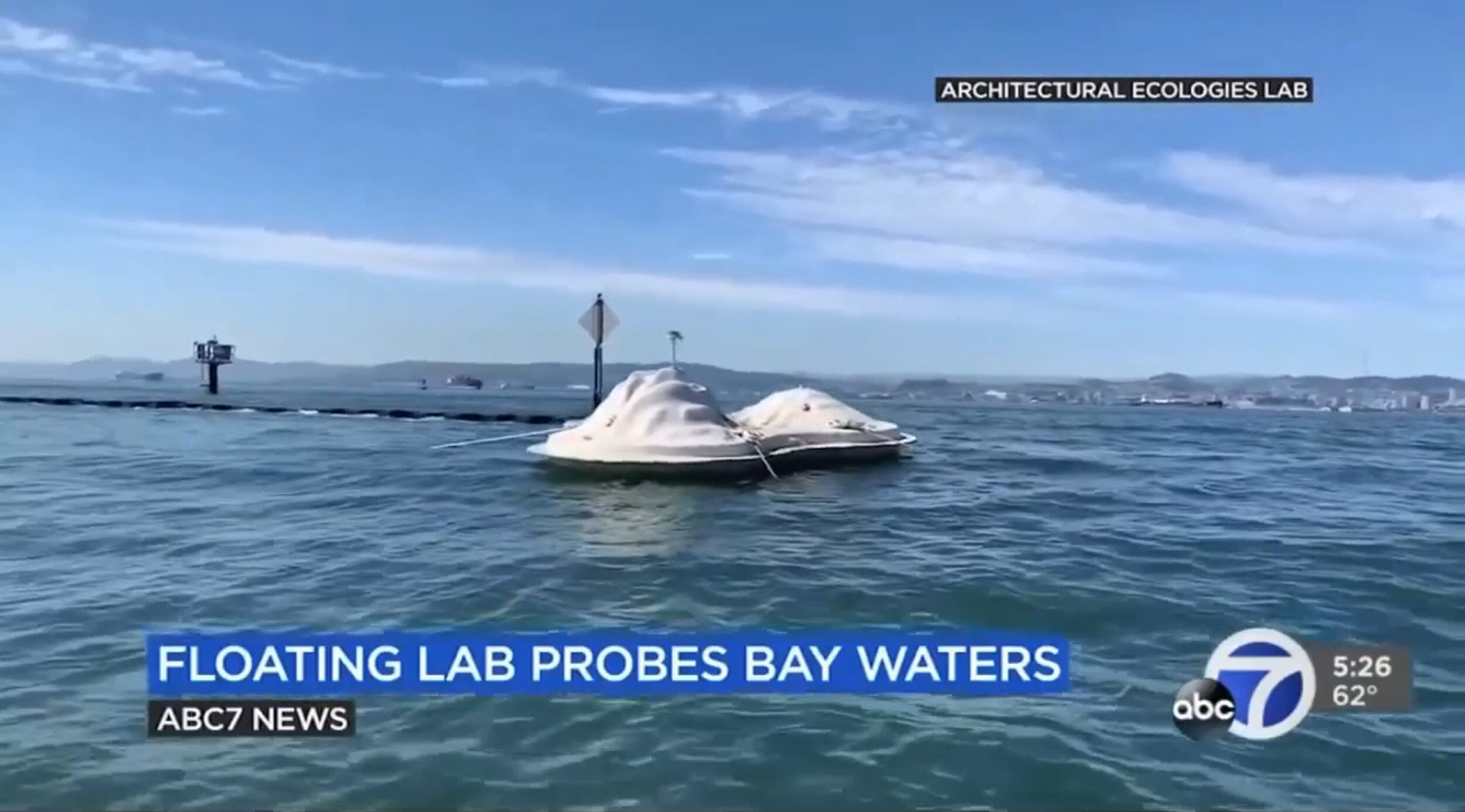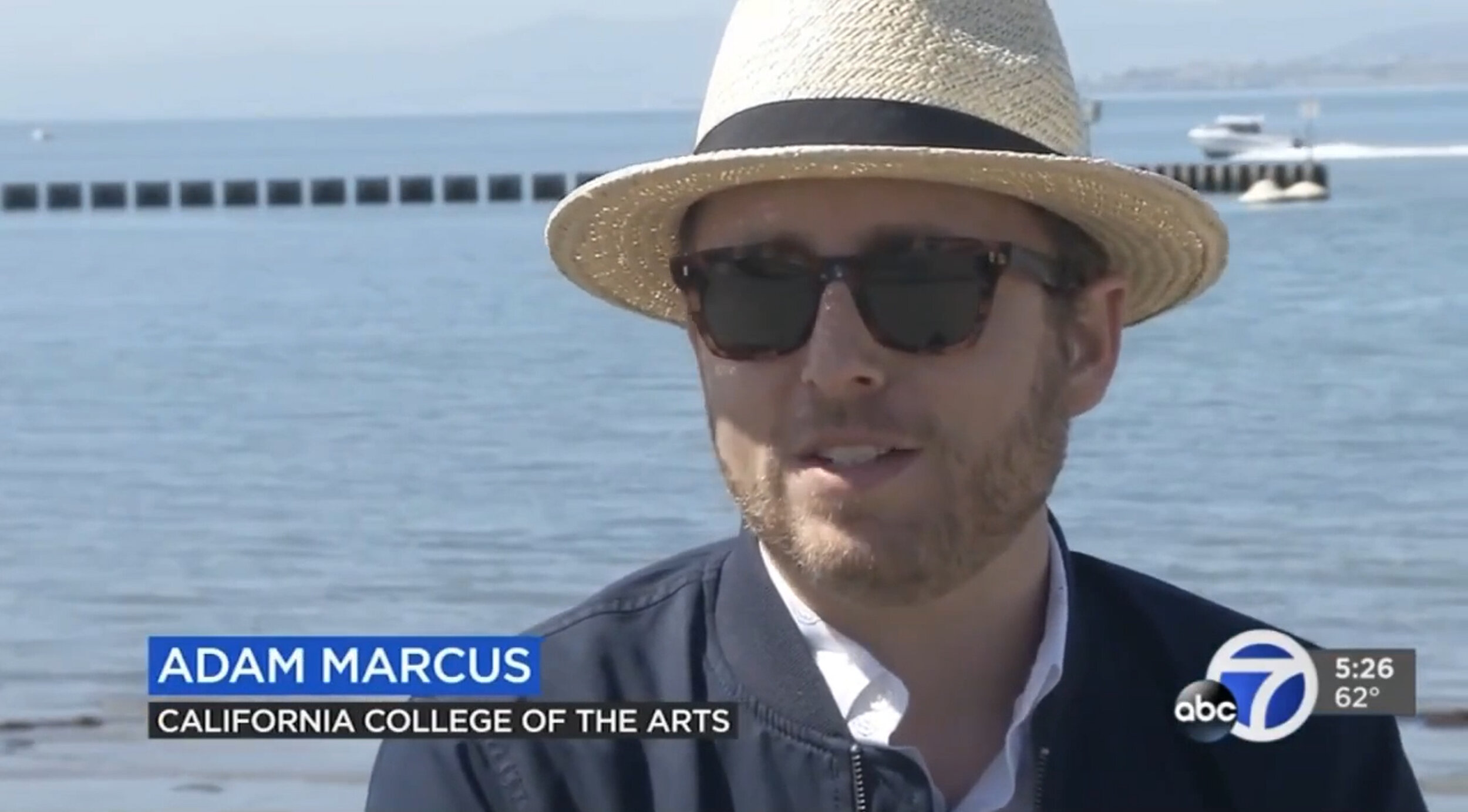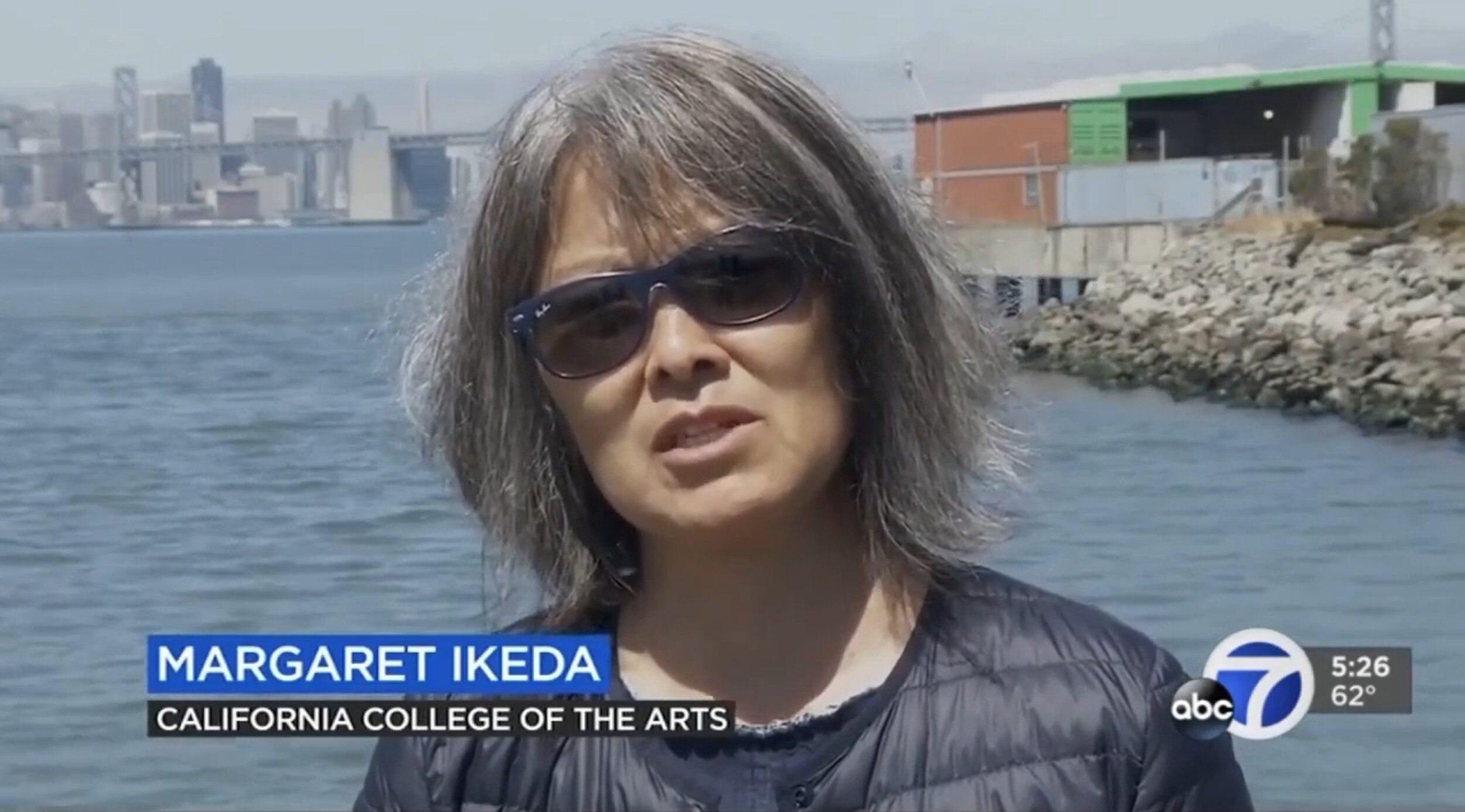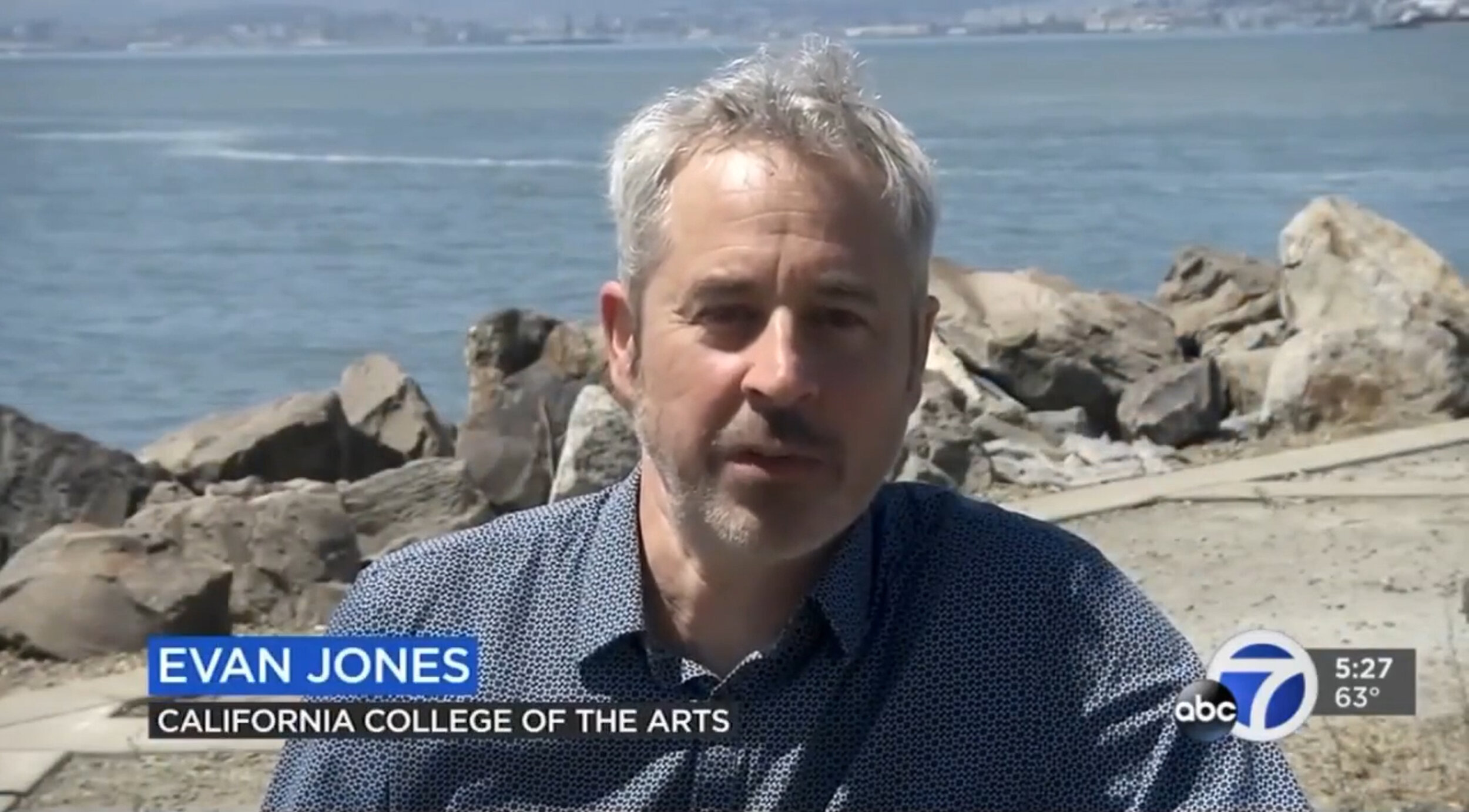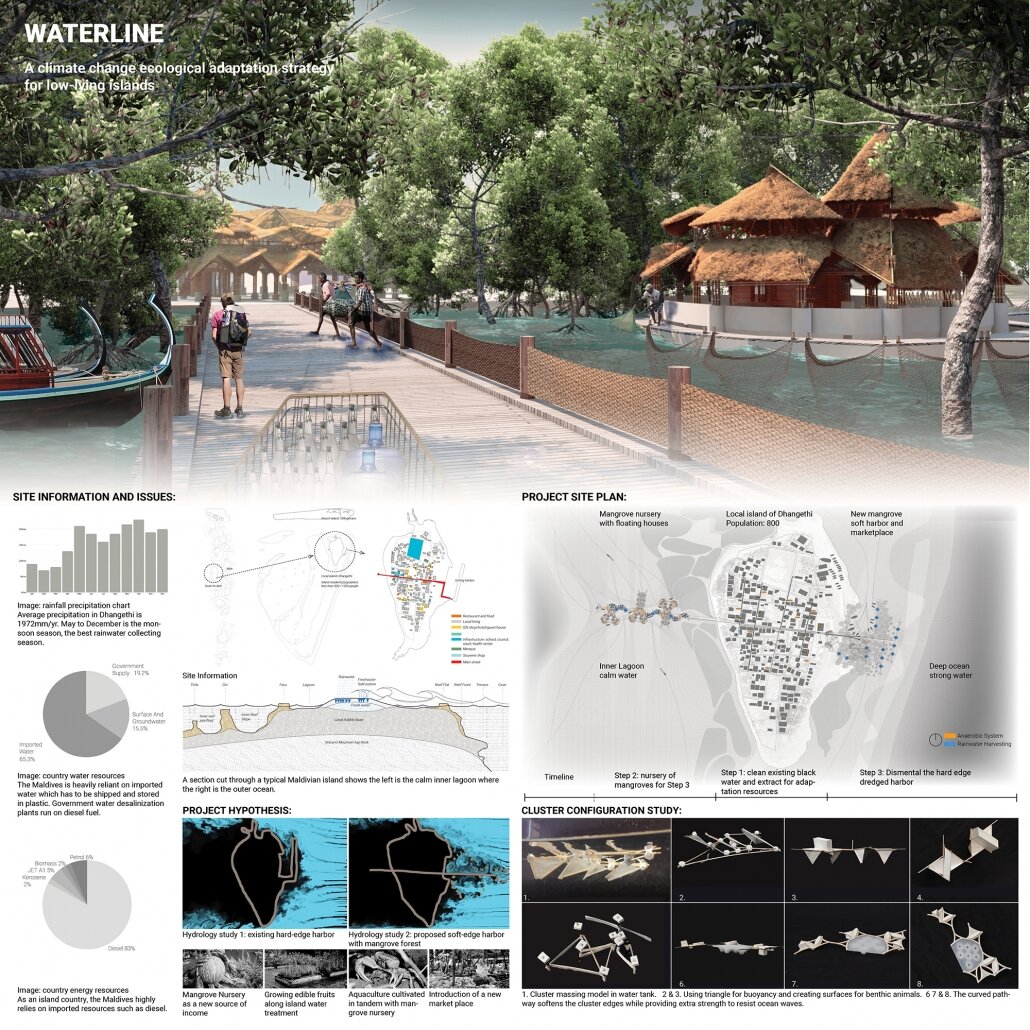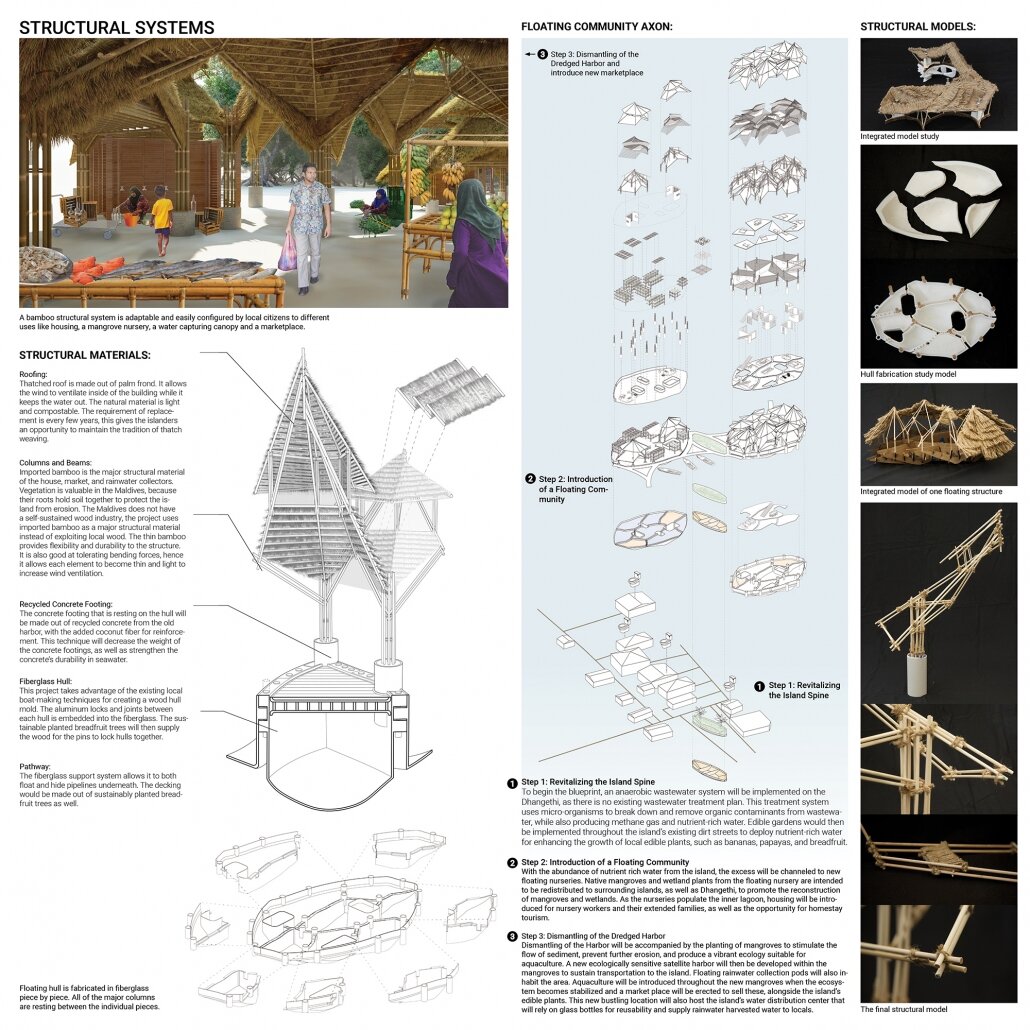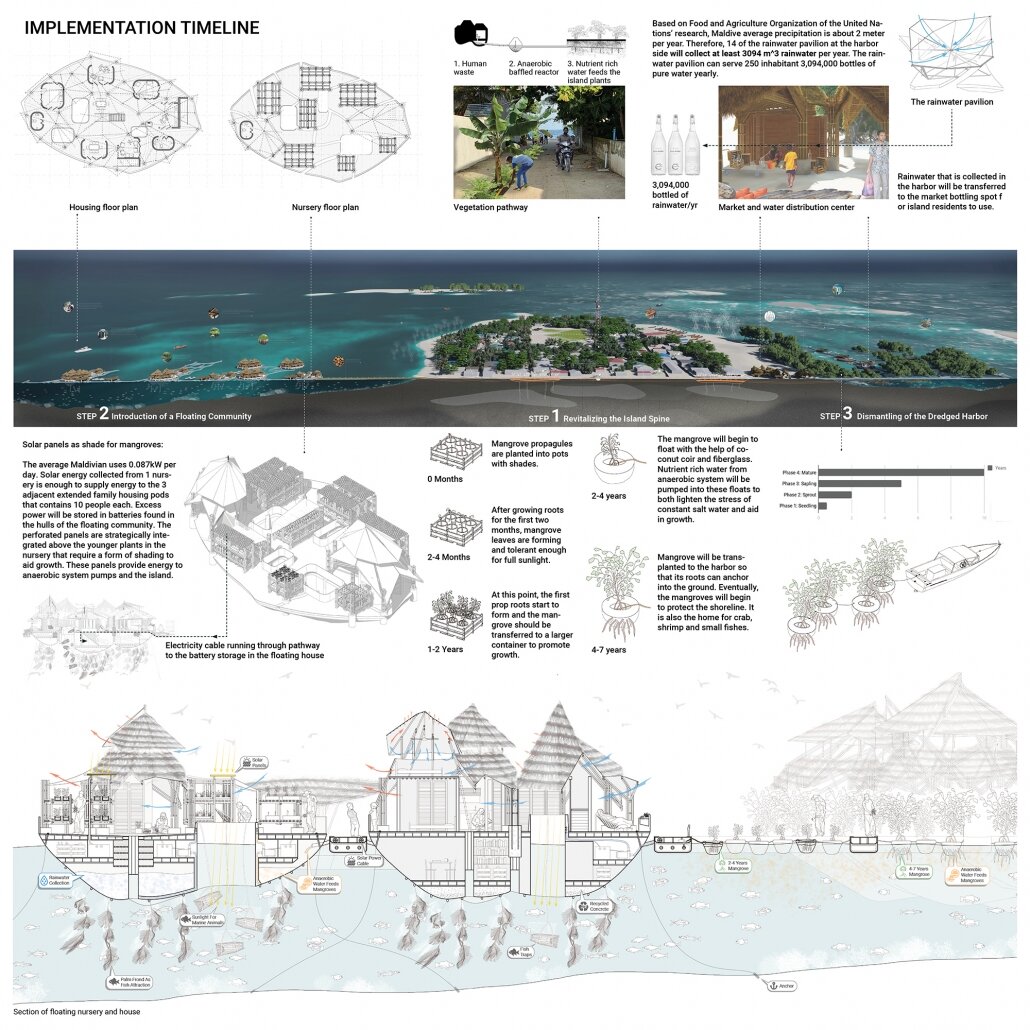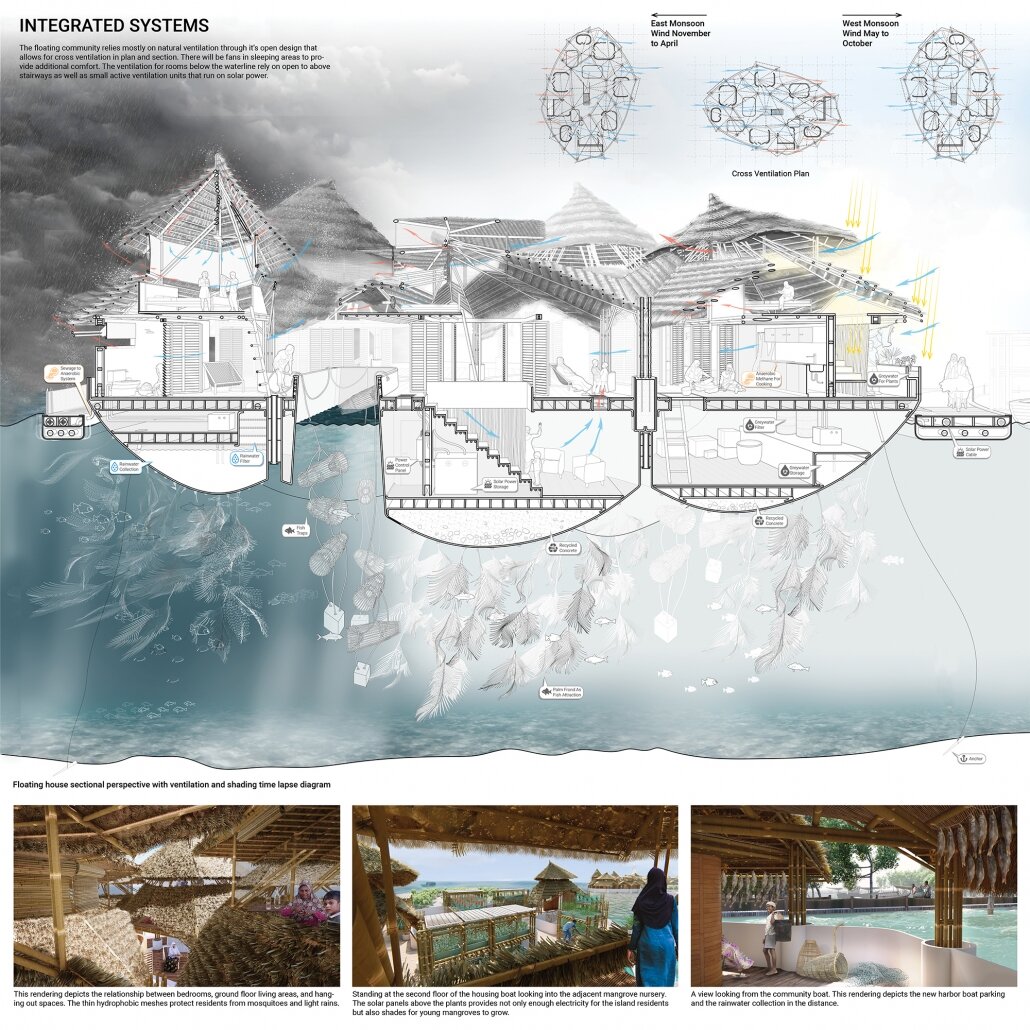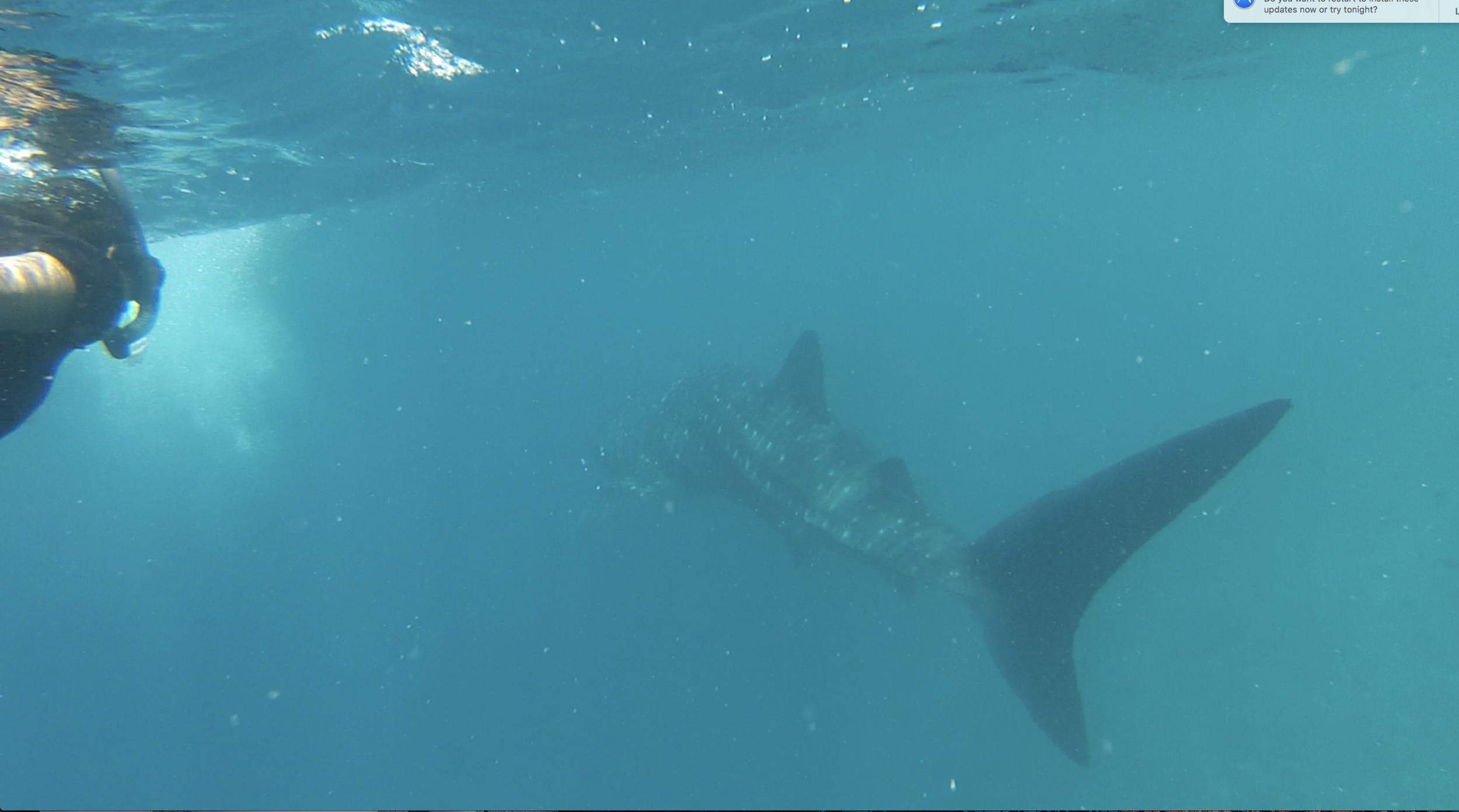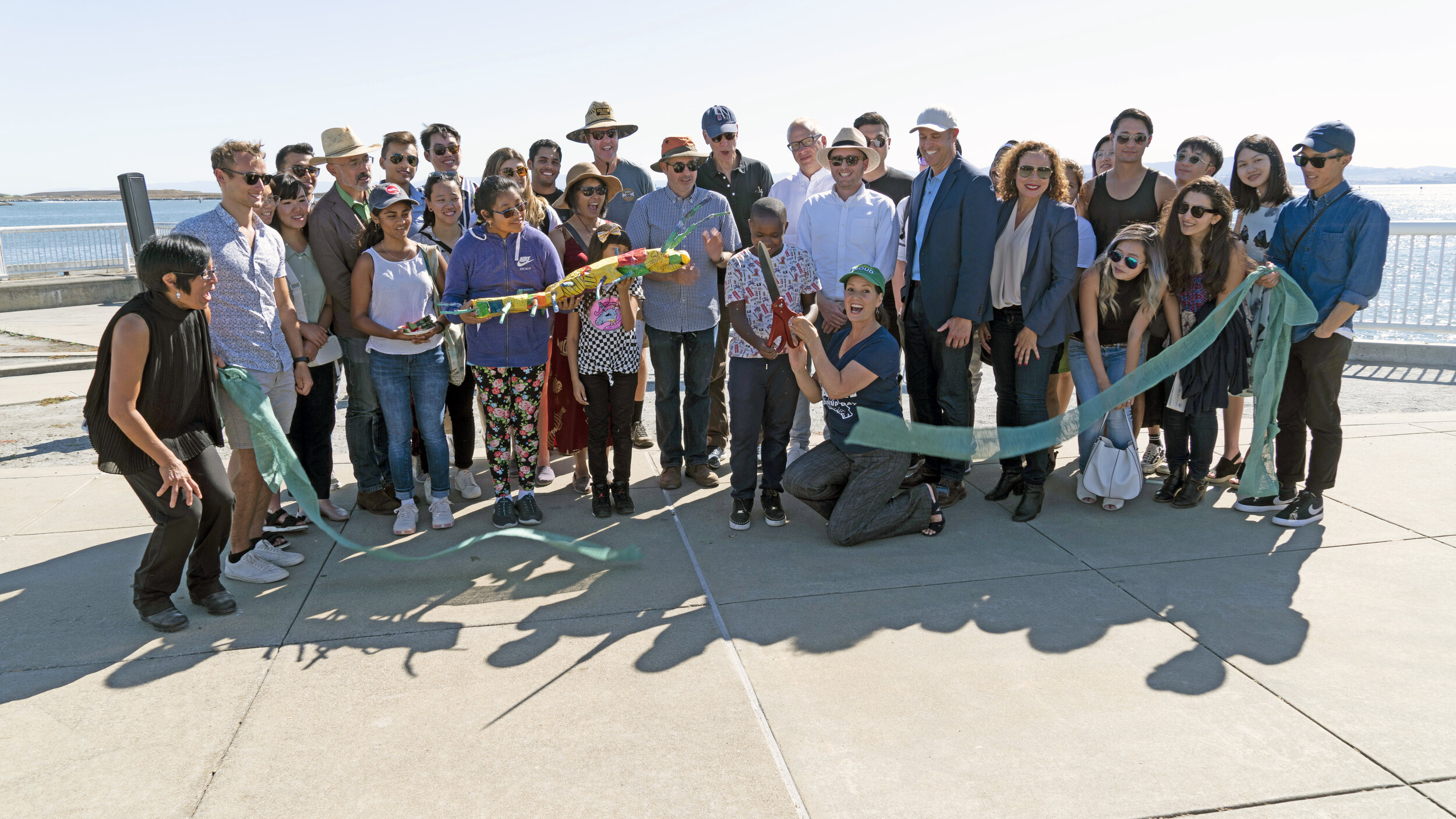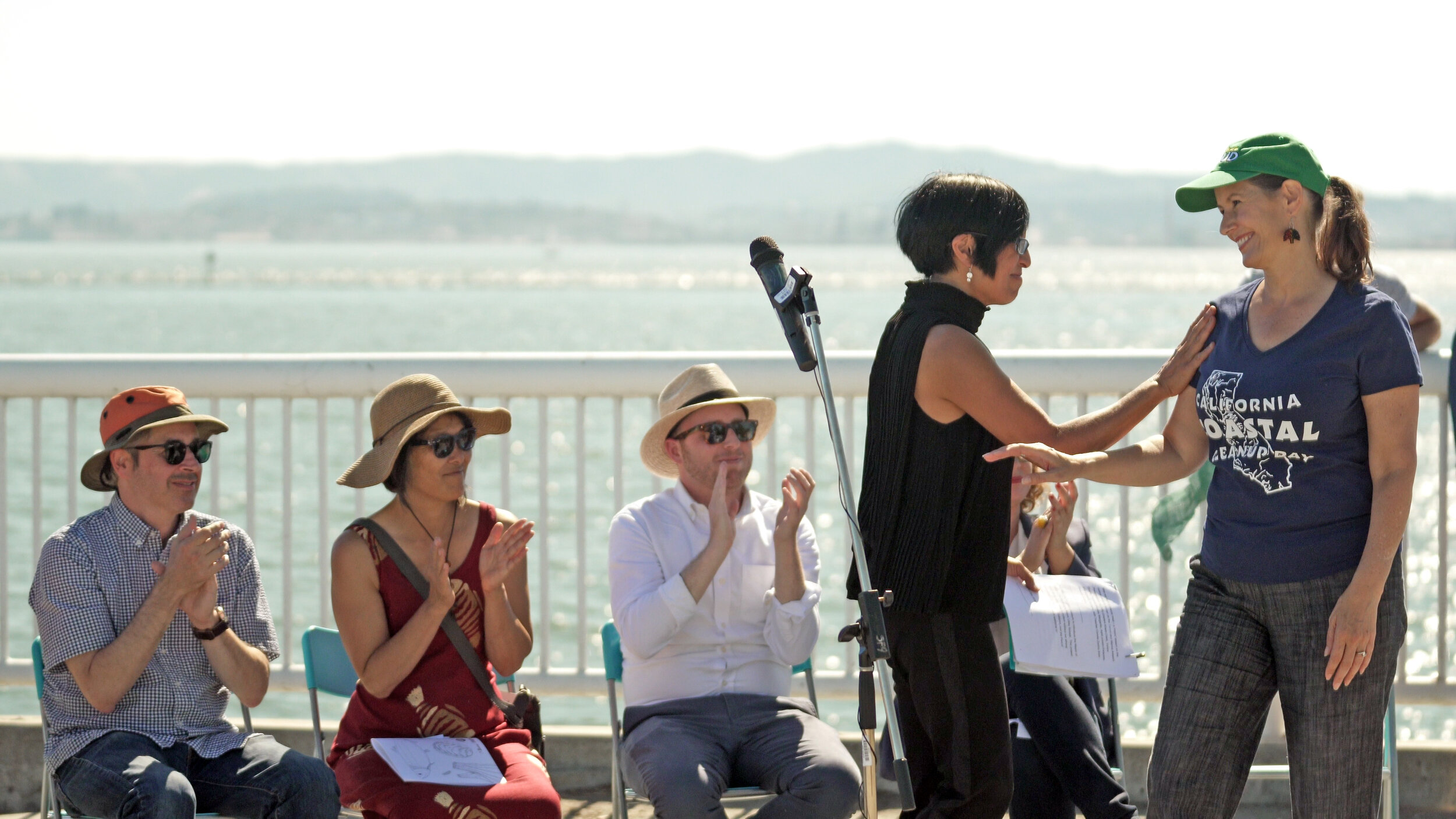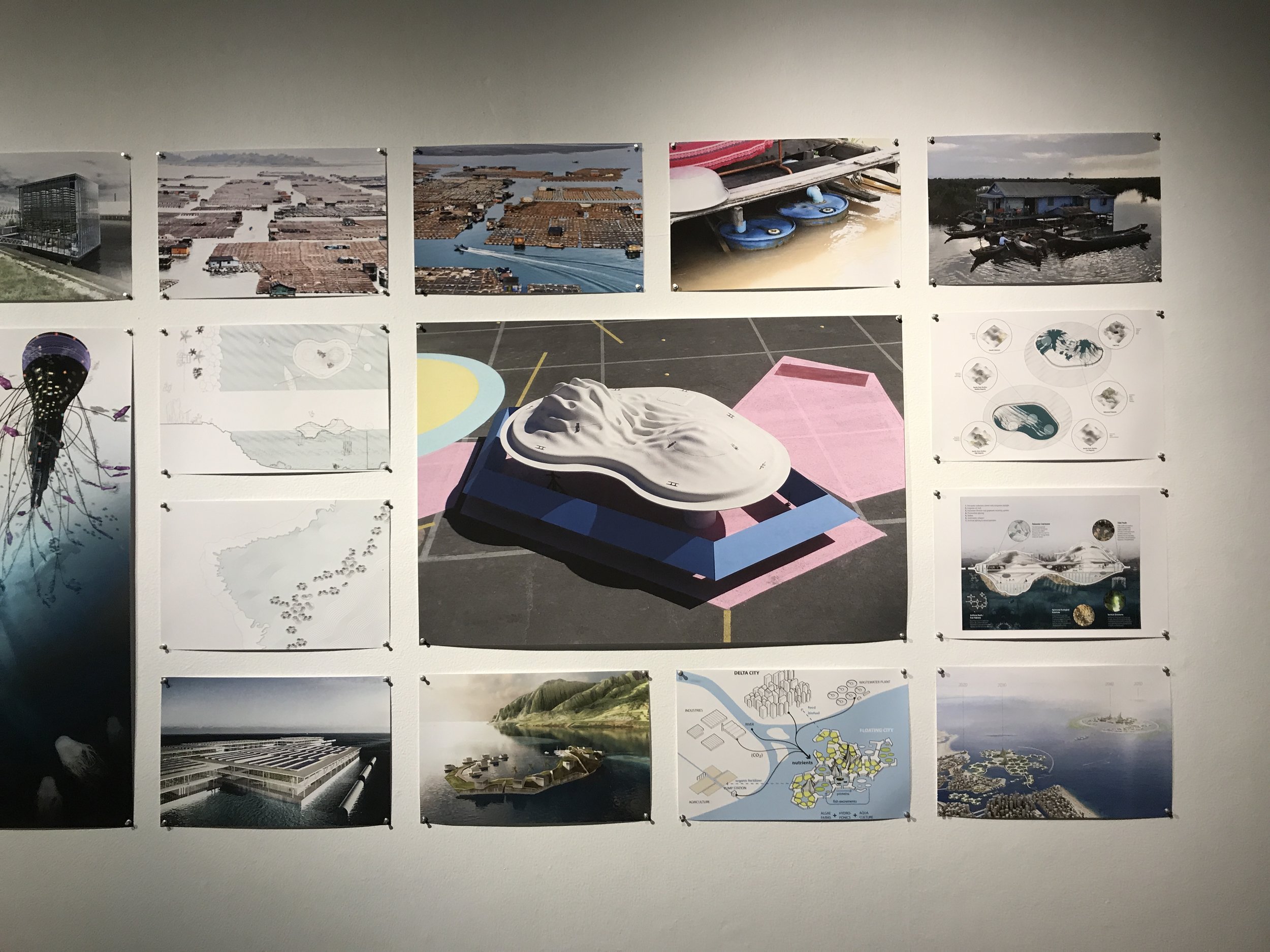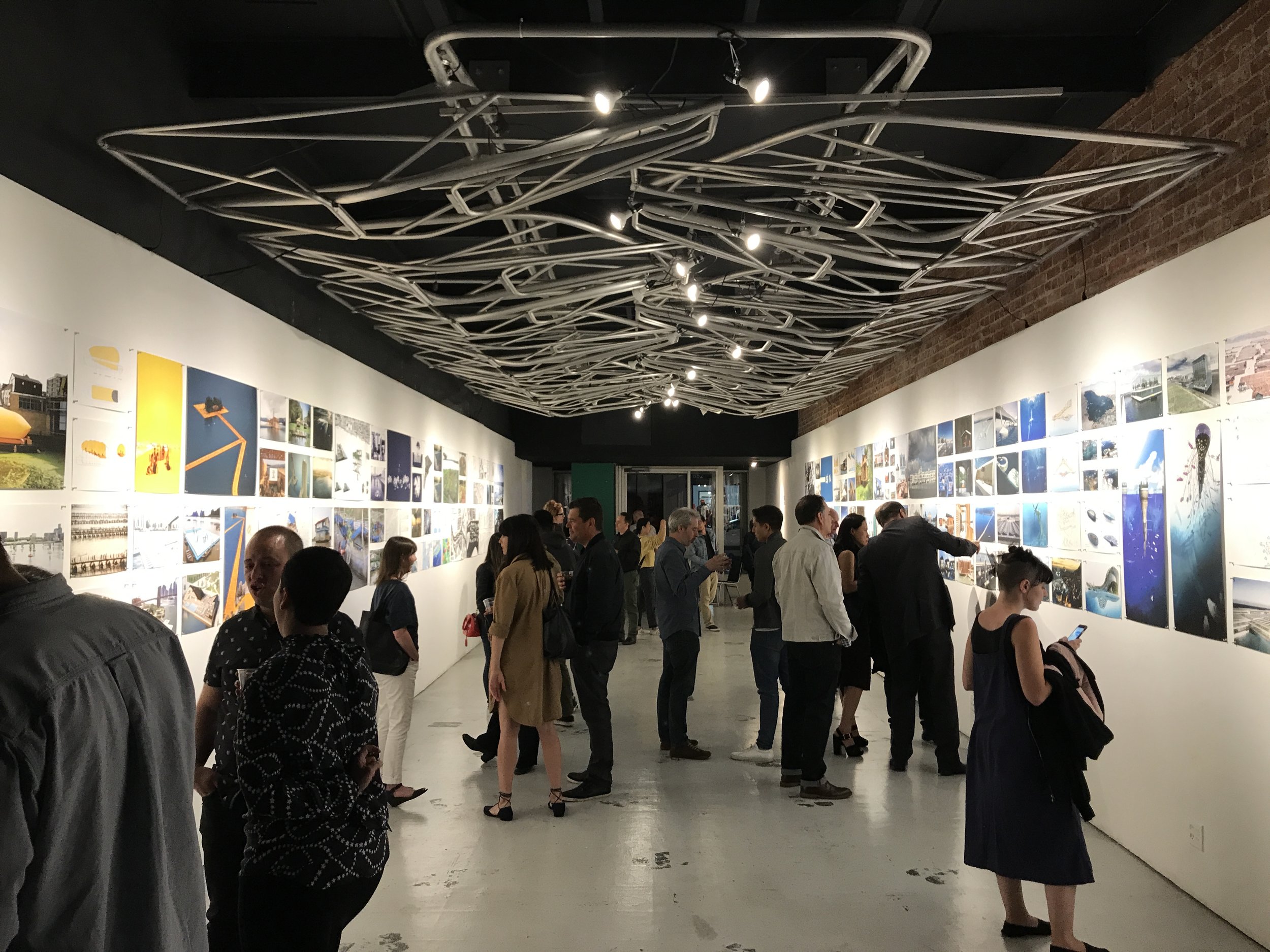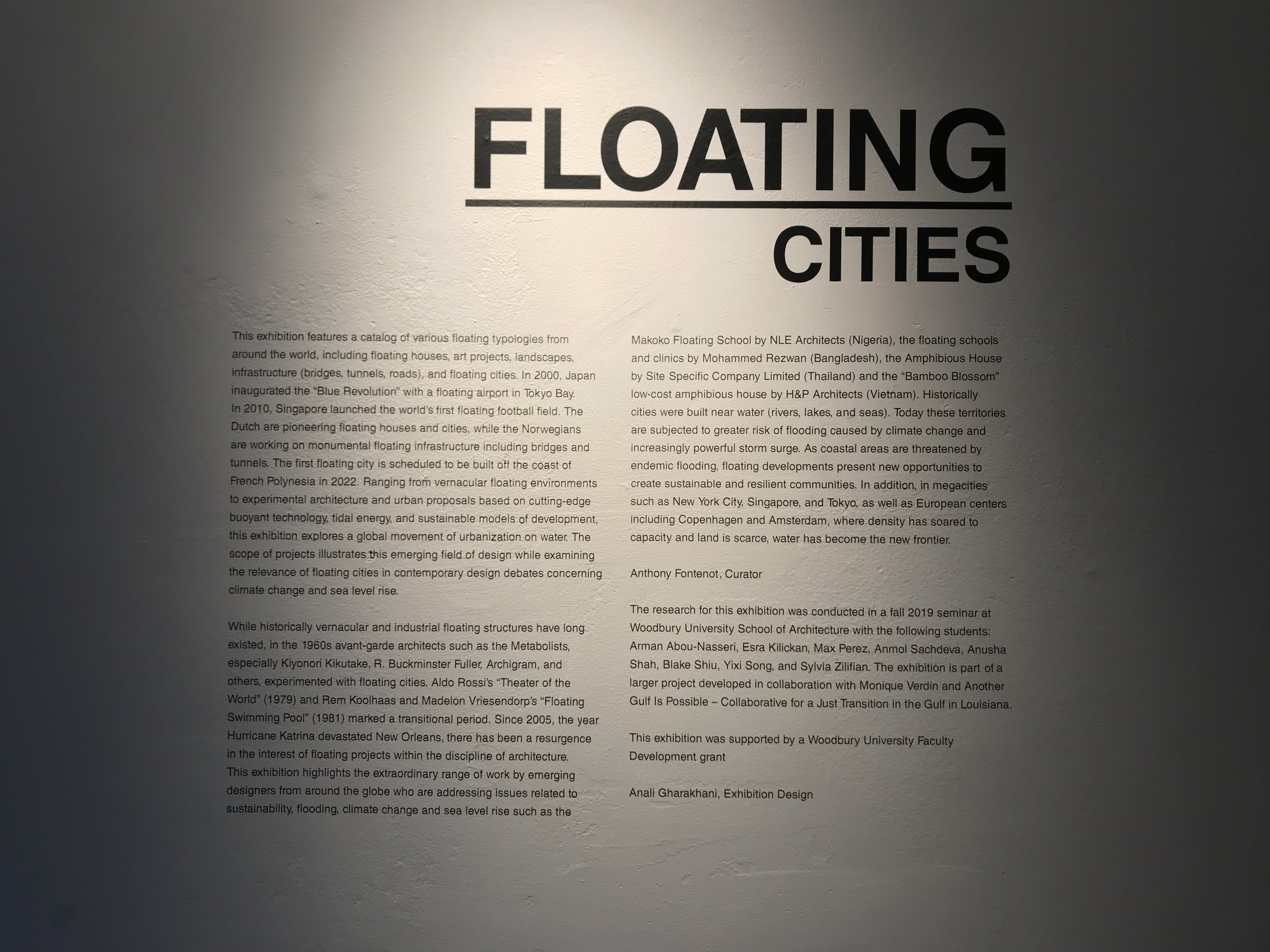On May 14, 2021, Adam Marcus participated in the Proxy Festival, a unique event organized by the McLuhan Centre for Culture and Technology at the University of Toronto and hosted by Simon Frasier University’s School of Communication. The festival was organized as an online event exploring our always-online moment and the possibilities that networked experience can offer for the creation of new forms of cultural practice, of embodiment, of place-making, and of experimentation with social conventions. Adam presented a short film that provided a remote, virtual visit to the Buoyant Ecologies Float Lab, which currently floats off in San Francisco Bay off of the Oakland shoreline.
Buoyant Ecologies Float Lab Featured on ABC7 Evening News
The Buoyant Ecologies Float Lab project was recently featured in a story on ABC7 Evening News, by Dan Ashley and Tim Didion. AEL directors Margaret Ikeda, Evan Jones, and Adam Marcus were interviewed on site for the story, discussing how the Float Lab’s research might inform how cities adapt to climate change and sea level rise.
Link: 'Upside down floating reef' in the San Francisco Bay could change ecology of shoreline, experts hope.
Buoyant Ecologies Students Selected for 2020 ACSA / AIA COTE Top Ten
Bachelor of Architecture students Jingyi Emma Luo and Cera Yeo from the fall 2019 Buoyant Blueprint studio have been announced as winners of the AIA COTE Top Ten for Students Design Competition.
The American Institute of Architects Committee on the Environment (AIA COTE), in partnership with Association of Collegiate Schools of Architecture (ACSA), selected the recipients of the national awards. The competition recognizes ten exceptional studio projects that demonstrate designs moving towards carbon-neutral operation through creative and innovative integration of design strategies such as daylighting, passive heating and cooling, materials, water, energy generation, and sustainable systems. The program challenged students to submit projects that use a thoroughly integrated approach to architecture, natural systems, and technology to provide architectural solutions that protect and enhance the environment.
Jurors included Elgin Cleckley (University of Virginia), Carly Coulson (COULSON), Michael Horan (Clemson University), Tom Kundig (Olson Kundig), and Adrian Parr (University of Texas at Arlington).
The Buoyant Blueprint advanced Integrated Building Design studio, led by CCA faculty Margaret Ikeda, and Evan Jones, is part of an ongoing research partnership between CCA, Autodesk's Technology Center San Francisco, Kreysler & Associates, and the Benthic Lab at Moss Landing Marine Laboratories. The research is focused on developing innovative material approaches to resilient waterfront structures.
The selected project, Waterline by Jingyi Emma Luo and Cera Yeo, proposes a strategy for architectural adaptation to climate change for low-lying islands. Sited in the Maldives, the project integrates a mangrove nursery and advanced water recycling systems into a phased plan for a self-sustaining floating community. From the jury citation: "Waterline is a powerful sustainable design solution with cultural foundation. The project details provide a level of excitement and thoughtfulness, which is stunning at first glance that never loses that level of interest throughout the details. The well-executed renderings and details present a realistic design that creates a fantastical sense of place and compelling construction technology.”
Buoyant Ecologies Students Named Finalists in Kiribati Floating Houses Competition
Two teams of Bachelor of Architecture students from the fall 2019 Buoyant Ecologies Blueprint studio have been named as finalists in the Kiribati Floating Houses Competition. The competition invited participants to speculate on forms of floating housing for Kiribati, an island nation located in the central Pacific Ocean that is increasingly vulnerable to climate change and sea level rise.
The Buoyant Ecologies Blueprint advanced Integrated Building Design studio, led by CCA faculty Margaret Ikeda, and Evan Jones, is part of an ongoing research partnership between CCA, Autodesk's Technology Center San Francisco, Kreysler & Associates, and the Benthic Lab at Moss Landing Marine Laboratories. The research is focused on developing innovative material approaches to resilient waterfront structures.
The two CCA student teams selected as finalists are: City^2, by Jiaqi Cao, Jiaqi Deng, and Yuchen Li; and Kiribati Floating Community, by Jingyi Emma Luo and Cera Yeo. Congratulations to the students on this achievement!
Adam Marcus Presents at Columbia University GSAPP
On February 7, Adam Marcus presented the Buoyant Ecologies Float Lab project at Columbia University Graduate School of Architecture, Planning and Preservation, as part of a panel featuring recipients of the 2019-2020 GSAPP Incubator Prize.
Buoyant Ecologies Float Lab Wins ACSA Faculty Design Award
The Buoyant Ecologies Float Lab, a project designed by AEL directors Adam Marcus, Margaret Ikeda, and Evan Jones in collaboration with partners at the Benthic Lab at Moss Landing Marine Laboratories and Kreysler & Associates, has been recognized by the Association of Collegiate Schools of Architecture (ACSA) with a Faculty Design Award as part of the 2020 Architectural Education Awards program. The Float Lab is a pilot for a floating breakwater, recently launched in San Francisco Bay for a three-year deployment as a floating research laboratory developing new material approaches to resilience and climate adaptation.
Each year, ACSA honors architectural educators for exemplary work in areas such as building design, community collaborations, scholarship, and service. Award winners inspire and challenge students, contribute to the profession’s knowledge base, and extend their work beyond the borders of academy into practice and the public sector. The Faculty Design Awards provide a venue for work that advances the reflective nature of practice and teaching by recognizing and encouraging outstanding work in architecture and related environmental design fields as a critical endeavor.
Jurors for this year’s Faculty Design Awards were Rania Ghosn (MIT Architecture), Courtney Crosson (University of Arizona), and Jennifer Bonner (Harvard University).
Previous recognition of the Float Lab includes a 2019 AIA Innovation Award, an Editor’s Choice in the 2019 Architect’s Newspaper Best of Design Awards, the 2019 CCA Impact Award, the 2019-2020 GSAPP Incubator Prize, a 2018 Architect magazine R+D Award, and selection for the Buckminster Fuller Institute’s Catalyst Program in 2017.
Buoyant Ecologies Float Lab Recognized by Architect's Newspaper Best of Design Awards
The Buoyant Ecologies Float Lab, a project designed by AEL directors Adam Marcus, Margaret Ikeda, and Evan Jones in collaboration with partners at the Benthic Lab at Moss Landing Marine Laboratories and Kreysler & Associates, has been recognized by the Architect’s Newspaper as an Editor’s Choice in the 2019 Best of Design Awards, for the Research category. The Float Lab is a pilot for a floating breakwater, recently launched in San Francisco Bay for a three-year deployment as a floating research laboratory developing new material approaches to resilience and climate adaptation.
Margaret Ikeda Presents at ACSA Administrators Conference in New Orleans
On November 9, Margaret Ikeda presented the Buoyant Ecologies research at the 2019 ACSA Administrators Conference “UNCERTAINTY” at Tulane University in New Orleans, LA. Margaret presented as part of the panel “Water Scarcity, Flood, and Climate Change,” organized by Dr. Adrian Parr, Dean of the College of Architecture, Planning and Public Affairs at the University of Texas at Arlington.
Margaret Ikeda Presents Research in Warsaw, Poland
On October 14-16, Margaret Ikeda presented the Buoyant Ecologies research as one of the Plenary Speakers at the International Conference on Amphibious Architecture, Design and Engineering at Warsaw University of Technology in Poland.
Photo by Joshua Eufinger
Buoyant Ecologies Float Lab Wins AIA Innovation Award
The Buoyant Ecologies Float Lab, a project designed by AEL directors Adam Marcus, Margaret Ikeda, and Evan Jones in collaboration with partners at the Benthic Lab at Moss Landing Marine Laboratories and Kreysler & Associates, has been recognized by the American Institute of Architects with a 2019 Innovation Award. The Float Lab is a pilot for a floating breakwater, recently launched in San Francisco Bay for a three-year deployment as a floating research laboratory developing new material approaches to resilience and climate adaptation.
The AIA Innovation Awards recognize the exemplary use and implementation of innovative technologies and progressive practices among architects and designers, collaborators, and clients. Recipients include the most technologically advanced and forward-thinking projects by architects practicing internationally.
Jurors for this years awards program included Anthony Hauck (Hypar AEC), Phillip Bernstein, FAIA, (Yale University School of Architecture), Desiree Mackey (GEI Consultants), Sera Maloney (The Foth Companies), and Natasha Luthra (Jacobs).
In their award statement, the jury referred to the Float Lab as “a terrific project that combines pedagogy, sustainability, design technology, practice, and fabrication. This is the future architecture should be building—integration with and enhancement of the natural environment."
Link: Buoyant Ecologies Float Lab wins 2019 AIA Innovation Award
Architectural Ecologies Lab Team Leads Research Trip to the Maldives
Interdisciplinary Cohort Explores Radical Alternatives through Field Work and Public Engagement.
What better way to spend an ecological summer break than investigating the effects of climate change in the highly impacted Maldives? An interdisciplinary team from the Architectural Ecologies Lab did just that. This past July, three California College of the Arts faculty from the Architectural Ecologies Lab joined two scientists for a two-week field trip to the Maldives, an island nation in the Indian Ocean of 1,200 small coral islands, 200 of which are are human-inhabited.
The Maldives face immediate and urgent impacts of sea-level rise caused by climate change, including disastrous, recent coral bleaching due to ocean warming. CCA faculty Margaret Ikeda, Evan Jones, and Leslie Carol Roberts joined Dr. John Oliver of the Benthic Lab at Moss Landing Marine Laboratories and the biologist Jo Guerrero on a visit to numerous islands, conducting field work and sharing research and design work by California College of the Arts faculty and students interrogating ecological changes and how we might mediate the effects through varied approaches.
Professors Ikeda and Jones lead the Buoyant Ecologies Maldives integrated architecture studio, which began work in 2017 to develop speculative proposals for floating communities in the Maldives. Professor Roberts co-directs the Ecopoesis Project, an interdisciplinary initiative of the AEL and CCA’s MFA in Writing Program, exploring how we use language to grasp and process life, human and non-human, in the sixth extinction.
The team’s research brief included field work and interviews to better map and understand the complex island culture, politics, economies, infrastructure, and marine ecology. The team left with optimism about future collaborations and strategies for partnerships this fall semester and beyond.
Highlights:
An evening lecture and panel discussion at The Maldives National University (MNU) with more than 150 attendees, including former president and climate activist President Mohamed Nasheed; Dr. Mohamed Latheef, the Chancellor of MNU, and Dr. Shazla Mohamed, Dean of Engineering, Science and Technology (home of the architecture department).
Professors Ikeda and Jones were invited guest reviewers at MNU for the final studio presentation for a fourth-year undergraduate studio, which explored the planning and development of a community over water.
A two-day exhibition in Male’ (the capital city) of Buoyant Ecologies Maldives studio work, followed the talks. This work had previously been exhibited at the Hubbell Gallery at CCA in February, 2019 (curated by CCA faculty member Michael Bogan) and at the Benthic Lab Open House in April, 2019. This event was an opportunity to meet with the public and discuss the studio projects on exhibit. Many people attended, including representatives from government agencies who were curious about both the adaptive design approaches and the incorporation of sustainable systems. These initial meetings have cultivated relationships with a new constituency who have become an essential resource for this fall’s Buoyant Ecologies Maldives studio, currently underway at CCA.
Professor Roberts led a series of Ecopoesis dialogues with Maldivian students and visitors to the exhibition, interviewing them and discussing local perspectives on how climate change impacts economic, social, and ecological dimensions of daily life.
The island of Dhangethi, the site of the Buoyant Ecologies Maldives studio, was the main focal point of the trip. After a three-hour speed boat trip in heavy monsoon seas, the team spent three days meeting with island residents, learning about the local infrastructure, understanding the island’s hydrology, and recording thoughts on climate. Most of their time was spent on the water, including snorkelling with the majestic whale shark, observing the marine eco-tourism industry, and talking to local divers. The biologists, both divers, explored an adjacent marine sanctuary, and documented the shallow and deep lagoons that skirt the island of Dhangethi. Dhangethi, with a population of 500, is looking to grow its tourist economy. The implications of a heavier human footprint on water use and effluent were explored and discussed with local leaders.
To better understand the Maldives economy, which is based on high-end, foreign-funded resorts and tourism, the team visited the Conrad (Hilton) Resort, home to a famed underwater restaurant and representative of the industry. The Conrad biologists explained the hotel’s coral restoration scheme and took the AEL into the waters for a closer view.. The next stop was the Banyan Tree Resort, a global hotel group based in Singapore. Banyan Tree has a reputation for serious commitment to marine biology research. Their resident marine biologist, Steve Newman, has more than two decades of dive work and research around coral and marine life in the Maldives. In addition, he is on a government panel that looks at how to better manage eco-tourism across the country. Connected to a research university in the UK, the Banyan Tree routinely hosts PhD students conducting research about the local ecologies. The hotel is also one of the only marine biology labs in the country. The AEL team saw documented extensive coral bleaching on this warmer inner island atoll and observed how sharks and other reef species were adapting. Oliver continues discussions with the biologist at Banyan Tree lab about possible research collaborations in the coming years.
Isha Fathmath, a 2018 Buoyant Ecologies Maldives student, 2019 CCA M.Arch graduate, and principal of Doric MV architecture based in the capital Male’ with local partner Layana Mohamed, coordinated all the public events and was invaluable to navigating the islands from a local perspective.
There is more to come with both ECOPOESIS and the Buoyant Ecologies team. Roberts and her CCA ECOPOESIS colleague Christopher Falliers are teaching a semester-long graduate seminar ECOPOESIS. This interdisciplinary course looks at embodied messaging around climate change, engaging in form-making and language to articulate climate change and the feelings of the sixth extinction. The Buoyant Ecologies team is incorporating the feedback of all their new partners into a third design studio, titled “A Blueprint for Resilience,” and has been working remotely with an MNU architecture studio sharing ideas around innovative technologies, cultural traditions and ecological adaptations.
Buoyant Ecologies Float Lab Featured in Dezeen
The Buoyant Ecologies Float Lab, a project led by AEL directors Adam Marcus, Margaret Ikeda, and Evan Jones, is featured in an article in influential architecture and design magazine Dezeen.
Link: “Float Lab designed to serve as new kind of architecture for climate adaptation” by Jenna McKnight in Dezeen
Community Event Celebrates the Launch of Buoyant Ecologies Float Lab
During a weekend of worldwide climate protests and California Coastal Cleanup Day, leaders from California College of the Arts (CCA), Oakland Mayor Libby Schaaf, Port of Oakland representatives, and community members gathered on Saturday, September 21, to commemorate the launch of the Buoyant Ecologies Float Lab in Oakland’s Middle Harbor. This innovative floating research station offers a first-of-its-kind approach to addressing the effects of climate change to be deployed in the San Francisco Bay. The event was organized by the Architectural Ecologies Lab in partnership with CCA Architecture Division and project funder CCA Center for Impact.
Led by CCA architecture faculty and AEL directors Adam Marcus, Margaret Ikeda, and Evan Jones, the Float Lab builds upon five years of applied research at CCA and merges expertise of architects and designers, advanced digital fabrication manufacturers, and marine ecologists. It is engineered to serve as a breakwater to reduce coastal erosion and also be a habitat for marine life in order to increase marine biodiversity. The Float Lab will be used as an educational tool in fulfillment of Middle Harbor Shoreline Park’s mission to be a place for learning about local history, natural environment, maritime activities, and stewardship for the environment.
The Float Lab launch celebration kicked off with a jazzy, New Orleans–style ceremonial procession performed by the Edna Brewer Middle School Band. The band led over 100 guests down to Port View Park, where the festivities and remarks took place. In the crowd were City of Oakland and Port of Oakland leaders, fifth grade students from Prescott School in West Oakland, musicians from Edna Brewer Middle School in Oakland, multiple community members, and CCA leadership and faculty, as well as current and former CCA students involved with the development of the Buoyant Ecologies research. The celebratory procession lead guests to Port View Park, where the community picnic joyfully commenced with food, refreshments, DIY kites, and coloring book activities as they viewed the Float Lab doing its work in the bay. The event even featured specialty 3D-printed Float Lab-shaped cakes, created by culinary artist and CCA M.Arch alum Carlos Sabogal.
The distinguished speakers then gathered for remarks. Speaking at the event were (in order): JD Beltran, director of CCA Center for Impact, Amy Tharpe, director of Social Responsibility, Port of Oakland; Adam Marcus, Margaret Ikeda, and Evan Jones, CCA Architecture faculty and Buoyant Ecologies Float Lab project leaders; Stephen Beal, CCA president; Keith Krumwiede, CCA dean of Architecture; fifth grade students from Prescott School; Brad McCrea, director of Regulatory Program, San Francisco Bay Conservation and Development Commission; and Richard Sinkoff, director of Environmental Programs and Planning, Port of Oakland; and Libby Schaaf, Mayor of Oakland.
Four students from educator Connie Zunino’s fifth grade class at Prescott School in West Oakland gave a special presentation about Tanaids, a small crustacean native to the bay. The students displayed a colorful, papier-mâché representation of a Tanaid while stating scientific facts delivered in rhyming poetic verse.
Oakland Mayor Libby Schaaf concluded the remarks. Wearing her California Coastal Cleanup T-shirt and green Oakland Proud ball cap, Mayor Schaaf delivered impassioned remarks about the importance of offering innovative solutions to climate change and expressed her commitment to environmental stewardship, especially for future generations: “What’s so exciting about the Float Lab is this is not just a scientific laboratory, this is a show of power from our students—our students at CCA, our students in the Oakland Unified School District—and just know that you have an entire community here in the city of Oakland cheering you on, telling you how important this work is, and telling you to use this information for good, for change.” She then shared the ceremonial ribbon-cutting moment with one of the fifth grade students from Prescott School.
“The challenges around environmental issues are just enormous, and we’re so proud of the work that our faculty and students have done to begin to address this,” said CCA President Stephen Beal. “The founder of CCA, Frederick Meyer, believed that the best thing was to take young creative people and to connect them to the complexities of social, political, and economic life. And that’s been at the heart of CCA for 112 years. Never has that been more important than it is today.”
Adam Marcus Receives GSAPP Incubator Prize from Columbia University
Adam Marcus has been selected as one of six recipients of the 2019-2020 GSAPP Incubator Prize, an initiative by Columbia University Graduate School of Architecture, Planning and Preservation to support projects created by GSAPP alumni that advance environmental concerns in architecture and its related fields.
Read MoreBuoyant Ecologies Float Lab Launches in San Francisco Bay
On August 27, 2019, the Architectural Ecologies Lab launched the Buoyant Ecologies Float Lab in San Francisco Bay for a three-year deployment as a research platform and environmental demonstration project.
Read MoreBuoyant Ecologies Float Lab Featured in Redshift
The Buoyant Ecologies Float Lab, a project led by AEL directors Adam Marcus, Margaret Ikeda, and Evan Jones, is featured in an article in Redshift by Zach Mortice.
Read MoreBuoyant Ecologies Float Lab Featured in The Architect's Newspaper
The Buoyant Ecologies Float Lab, a project led by AEL directors Adam Marcus, Margaret Ikeda, and Evan Jones, is featured in an article in The Architect’s Newspaper by Drew Zeiba.
Link: “Architects rethink material and form with a new floating lab” by Drew Zeiba in The Architect’s Newspaper
Buoyant Ecologies Float Lab Featured in Hyperallergic
The Buoyant Ecologies Float Lab, a project led by AEL directors Adam Marcus, Margaret Ikeda, and Evan Jones, is featured in an article in Hyperallergic by Louis Bury. Bury writes: “This combination of civic integrity, design ingenuity, and scientific rigor is what makes the Float Lab so promising. Both open-ended academic research and imaginative creation can feel untethered from workaday concerns. But AEL’s speculative eco-collaborations demonstrate the practical potential of seemingly impractical approaches.”
Link: “Building an Architecture for Climate Change” by Louis Bury in Hyperallergic
Buoyant Ecologies Project Wins 2019 Impact Award
The Buoyant Ecologies project, led by AEL directors Adam Marcus, Margaret Ikeda, and Evan Jones, was recently awarded a $25,000 Impact Award by the Center for Impact at CCA. This year’s theme of the annual competition—"Invention and Innovation in Creative Re-use, Upcycling, and/or Sustainable Materials"—sought solutions from the CCA community that address climate change through inventing environmentally friendly materials or by transforming consumer behavior. The 2019 Impact Award is generously supported by Thurlow Washam, the Center for Cultural Innovation, and the Center for Impact’s ImpactFund.
“The Impact Award recognizes the ingenuity and vision that emanates from thinkers and makers in the CCA community,” says JD Beltran, director of the Center for Impact. “The 25,000 USD grants serve as seed money to incubate projects that hold the promise of long-term impact in addressing social and environmental problems.”
The Buoyant Ecologies project synthesizes architectural design, marine ecology, and digital fabrication to develop resilient waterfront structures that simultaneously enhance biodiversity and mitigate coastal erosion. The team will test 3D-printed prototypes for ecological substrates—using calcium carbonate and advanced composites—on the newly deployed Buoyant Ecologies Float Lab, a scientific laboratory anchored off Oakland’s Middle Harbor Shoreline Park. Building on five years of research, the team is working in collaboration with the Benthic Lab at Moss Landing Marine Laboratories, manufacturer Kreysler & Associates, and the Port of Oakland.
“This project began as pure speculation—the notion that floating buildings could provide ecological benefit—and has grown into a robust, multidisciplinary research initiative,” explain the project leaders.
In addition to Ikeda, Jones, and Marcus, the winning Buoyant Ecologies team consists of CCA adjunct professors Alex Schofield and CCA Architecture students Vishnu Balunsat, Sean Cunningham, Joshua Eufinger, Viviani Isnata, Mithila Jagtap, Cassady Kenney, Cristian Laurent, Peter Pham, and Maria Ulloa.
Jurors for the 2019 Impact Award included Kristen DiStefano, associate director of Atelier Ten; George Henry Hines, founder and CEO of GHH Innovations; Deborah Munk, director of the Artist in Residence (AIR) Program at Recology; CCA associate professor Tim Smith, CCA MBA in Design Strategy program; and Mawuli Tugbenyoh, former commission liaison to the mayor of San Francisco.
Floating Cities Exhibition Opens in Los Angeles
On April 13, the exhibition Floating Cities, curated by Anthony Fontenot, opened at the WUHO Gallery in Los Angeles. The show features a catalog of various floating typologies from around the world, including floating houses, art projects, landscapes, infrastructure (bridges, tunnels, roads), and floating cities. It includes the Buoyant Ecologies Float Lab, a prototype for a floating breakwater designed by the Architectural Ecologies Lab. Also featured in the show are projects by Ant Farm + WORK AC, Lateral Office, Aptum Architecture with CEMEX Research Group, Archigram, Bjarke Ingels Group, Blue Frontiers, Rem Koolhaas and Madelon Vriesendorp, Kohn Pedersen Fox Associates, MOS Architects, NLE Architects, Morphosis Architects, and others.
The show is open until May 5. Later this year it will travel to Louisiana and Miami.


